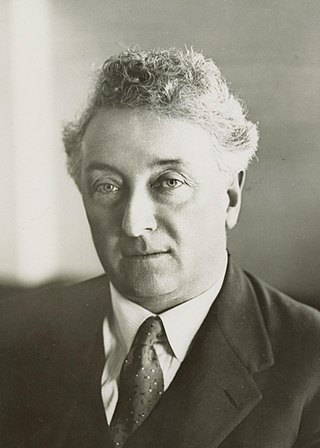
Joseph Aloysius Lyons was an Australian politician who served as the tenth prime minister of Australia, from 1932 until his death in 1939. He held office as the inaugural leader of the United Australia Party (UAP), having previously led the Tasmanian branch of the Australian Labor Party (ALP) before the Australian Labor Party split of 1931. He served as the 26th premier of Tasmania from 1923 to 1928.

John Earle was an Australian politician who served as Premier of Tasmania from 1914 to 1916 and also for one week in October 1909. He later served as a Senator for Tasmania from 1917 to 1923. Prior to entering politics, he worked as a miner and prospector. He began his career in the Australian Labor Party (ALP), helping to establish a local branch of the party, and was Tasmania's first ALP premier. However, he was expelled from the party during the 1916 split and joined the Nationalists, whom he represented in the Senate.

Sir Walter Henry Lee KCMG was an Australian politician and member of the Tasmanian House of Assembly. He was Premier of Tasmania on three occasions: from 15 April 1916 to 12 August 1922; from 14 August 1923 to 25 October 1923; and from 15 March 1934 to 22 June 1934.

Sir John Cameron McPhee, KCMG was an Australian politician and member of the Tasmanian House of Assembly. He was Premier of Tasmania from 15 June 1928 to 15 March 1934.

John Blyth Hayes was an Australian politician who served as a Senator for Tasmania from 1923 to 1947. He was President of the Senate from 1938 to 1941. Before entering federal politics, he had been a member of the Parliament of Tasmania from 1913 to 1923 and served as Premier of Tasmania for almost exactly one year, from 1922 to 1923.
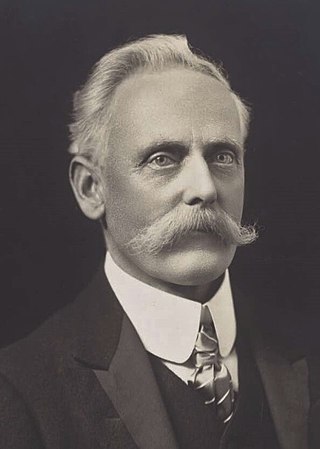
William James McWilliams was an Australian journalist and politician. He was the inaugural leader of the Country Party from 1920 to 1921 and served in federal parliament for nearly 20 years.
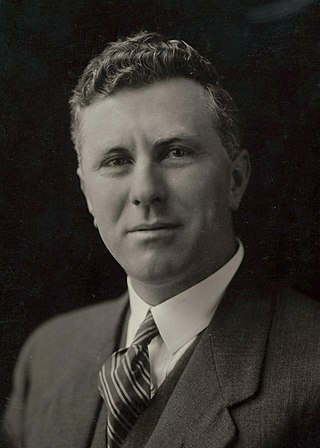
James Allan Guy, CBE was an Australian politician who represented the Australian Labor Party in both the Tasmanian House of Assembly and the Federal House of Representatives, before leaving to represent the United Australia Party and then the Liberal Party of Australia in both the House of Representatives and the Senate. His father, James Guy, had also been a Senator.

James Ernest Ogden was an Australian politician who was elected to the Tasmanian House of Assembly and the Australian Senate.

The 1969 Tasmanian state election was held on 10 May 1969 in the Australian state of Tasmania to elect 35 members of the Tasmanian House of Assembly. The election used the Hare-Clark proportional representation system — seven members were elected from each of five electorates.

The 1972 Tasmanian state election was held on 22 April 1972 in the Australian state of Tasmania to elect 35 members of the Tasmanian House of Assembly. The election used the Hare-Clark proportional representation system — seven members were elected from each of five electorates.

The 1919 Tasmanian state election was held on 31 May 1919 in the Australian state of Tasmania to elect 30 members of the Tasmanian House of Assembly. The election used the Hare-Clark proportional representation system — six members were elected from each of five electorates.

The 1922 Tasmanian state election was held on 10 June 1922 in the Australian state of Tasmania to elect 30 members of the Tasmanian House of Assembly. The election used the Hare-Clark proportional representation system — six members were elected from each of five electorates.
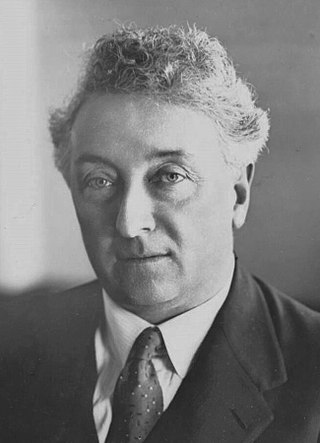
The 1925 Tasmanian state election was held on Wednesday, 3 June 1925 in the Australian state of Tasmania to elect 30 members of the Tasmanian House of Assembly. The election used the Hare-Clark proportional representation system — six members were elected from each of five electorates.

The 1931 Tasmanian state election was held on 9 May 1931 in the Australian state of Tasmania to elect 30 members of the Tasmanian House of Assembly. The election used the Hare-Clark proportional representation system — six members were elected from each of five electorates. For the first time, voting was compulsory, resulting in a high voter turnout.
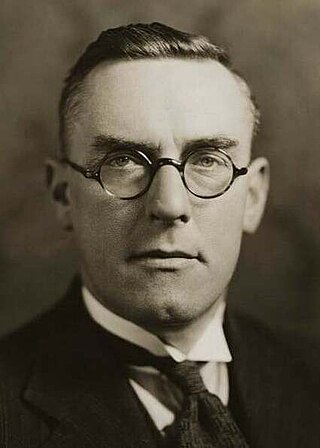
The 1934 Tasmanian state election was held on 9 June 1934 in the Australian state of Tasmania to elect 30 members of the Tasmanian House of Assembly. The election used the Hare-Clark proportional representation system — six members were elected from each of five electorates.

The 1941 Tasmanian state election was held on 13 December 1941 in the Australian state of Tasmania to elect 30 members of the Tasmanian House of Assembly. The election used the Hare-Clark proportional representation system — six members were elected from each of five electorates.
This is a list of members of the Tasmanian House of Assembly between the 30 May 1928 election and the 9 May 1931 election. The 1928 election failed to deliver a majority, and the Nationalists' John McPhee took over from Labor's Joseph Lyons as Premier of Tasmania. Lyons subsequently retired from state politics, obtaining election to the Federal seat of Wilmot and going on to become Prime Minister of Australia in 1931.

Sir Henry Seymour Baker was an Australian politician and lawyer. He served in the Parliament of Tasmania for nearly 40 years, initially as a Nationalist and Liberal in the House of Assembly (1928–1946) where he spent periods as attorney-general (1928–1934) and leader of the opposition (1936–1946). He later served in the Legislative Council (1948–1968), including as president (1959–1968). He was born in England and spent most of his childhood in New Zealand, arriving in Australia as a teenager.
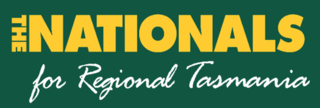
The Tasmanian Nationals are a political party in the Australian state of Tasmania, aligned with the National Party of Australia. The party is not currently registered with the Tasmanian Electoral Commission, and is not separately registered with the Australian Electoral Commission, unlike the other state branches of the Nationals.

The Tasmanian Labor Party, officially known as the Australian Labor Party and commonly referred to simply as Tasmanian Labor, is the Tasmanian branch of the Australian Labor Party. It has been one of the most successful state Labor parties in Australia in terms of electoral success.


















